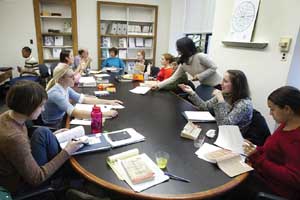Reform is the goal, training urban teachers the beginning
By Josh SchonwaldNews Office
 Kavita Kapadia, Interim Director of the Urban Teacher Education Program, hands out materials to begin a discussion in the ‘Soul Strand’ course she teaches with Marvin Hoffman, director of professional development at the North Kenwood/Oakland Charter School. Students study reflective readings about teaching, written by educators, in this part of the program.  Evelyn Pollins (left), a fourth-year in the College, has praised the readings from the class she is taking, instructed by Kavita Kapadia (center), Interim Director of the program. |
A new University program modeled after the teaching hospital method of mentorship is attempting to prepare fourth-year students for teaching in arguably the most challenging environment for educators: inner-city public schools.
Ten College students are currently participating in the pilot of the Urban Teacher Education Program, which is directed by the University’s Center for School Improvement.
Combining both academic and practical components and using resources from the University and its charter school in the North Kenwood neighborhood, the program will enable the fourth-years to earn an Illinois teacher certificate for kindergarten through ninth grade and a Master’s degree in Education through the Graham School.
Not only does the program revive an opportunity for students in the College to earn an Illinois teaching certificate (which ended when the Department of Education closed in 1998), but also it is a unique effort to apply the teaching hospital model of mentorship to teacher training.
The training ground for most of the two-year program will be at the University’s North Kenwood/Oakland Charter School. During the coming year, students will take three classes at the University and begin internships and attend seminars at the charter school. During the second year of the program, students will spend nearly 80 percent of their time testing their pedagogical skills in a classroom setting under the supervision of experienced teachers, in much the same manner physicians train medical students.
Part of the reason for experimenting with the teaching hospital model is the uniqueness of the challenge, said Anthony Bryk, the Marshall Field IV Professor in Sociology and the founding director of the Center for School Improvement. “We’re training teachers for service in some of the toughest schools,” Bryk said. “Many urban schools have an 80 percent teacher failure rate in the first years. We need to prepare teachers in a much more powerful way to be successful in schools.”
Tim Knowles, Executive Director of the Center for School Improvement, added that the program is beneficial to both training teachers and the school’s students. “Data have shown that the best hospitals, those with the best doctors and best patient care, are almost always teaching hospitals.”
The program was created in part as an extension of the Center for School Improvement’s effort to develop a model of new teacher training, but it also was created to provide Chicago students with new teaching opportunities. The Center for School Improvement has overseen a popular tutoring program for College students in recent years, and it conducted focus groups that show a growing number of Chicago students are interested in teaching careers. The College has, in recent years, been one of the largest suppliers of Teach for America applicants in the country. Last year, in fact, nearly one out of every 10 graduating fourth-years applied to the program.
But Knowles, who helped to start the Teach for America program, said the Urban Teacher Education Program has a very different goal. “Teach for America is a great program,” he said, but it provides limited training. Young teachers with little training, he said, “are too often eaten alive by dysfunctional school culture and tough working conditions.”
Bryk added that stemming teacher failure and lowering the teacher turnover rate is critical in improving urban schools. “In primary education for at-risk youth, the implications of losing a teacher are severe,” Bryk said. “Every time a teacher fails, it’s a disastrous year for 30 kids.”
“We want to capitalize on the enthusiasm and energy and socially minded students that are drawn to Teach for America,” he said, “but we want to create an environment for success.”
While the Urban Teacher Education Program is the first attempt by the 15-year old Center for School Improvement to train new teachers at the North Kenwood/Oakland Charter School, the charter school has functioned as a teacher training facility since it was founded in 1998. The Center for School Improvement bases its literacy training and leadership development programs at the school. The center and the school also function as headquarters for the New Teacher Network, a group that provides support services for 60 teachers in their first and second years. A culture of learning already exists there, Knowles said. “I don’t know of any other pre-eminent university that is running a school that is quite like this,” he added.
Both Knowles and Bryk emphasized that the focus is on training students for success in typical urban public schools. The charter school is designed as a model Chicago public school, functioning at a high level-its student population mirrors that of a typical Chicago public school. The Urban Teacher Education Program will prepare College students for what Knowles described as the reality of working in public, urban schools. “It will help them to navigate the complex waters of schools facing tough odds, provide them with the support they need in their first two years in the classroom and make a fundamental difference in the lives of urban children,” said Knowles.
The Urban Teacher Education Program will have a more rigorous academic component than most teacher training programs, Bryk said.
“Instead of reading excerpts from texts, our students will read the primary texts in their entirety,” he said. “In that manner, it’s very University of Chicago.”
Three core classes will introduce students to the program and will be team-taught by Center for School Improvement faculty and staff, including Bryk, Craig Cunningham, Marvin Hoffman, director of professional development at the North Kenwood/Oakland Charter School, and Kavita Kapadia, Interim Director of the program.
Schools and Communities will explore the history of public education, with a particular eye to the role of education in an urban environment and the recent work of educational reformers; Teaching and Learning will begin to introduce the theories and observational skills needed to analyze teacher and student performance, and the sociocultural dynamics of a classroom; and Purposes and Effect will look at contemporary issues through a philosophical framework from such educational reformers as Aristotle to Dewey. “Our goal is to give our students a sound theoretical framework to understand the classroom,” Bryk said.
Throughout the first year of the program, fourth-years also will participate in two supplementary programs, “Soul Strand” and “Fieldwork Strand.” In “Soul Strand,” the students will meet with Hoffman and Kapadia to discuss why teaching matters, why people go into teaching and why for many it is considered a calling. They will read reflective works on teaching and will write about their own experiences in the classroom.
“Fieldwork Strand,” which will take place primarily at the charter school, will give the students first-hand experience as educators. Beginning in the Fall Quarter, they tutor children in the after-school program and gradually progress toward small-group literacy teaching during the Summer Quarter.
The second year of the program, dubbed the “clinical year,” will emphasize fieldwork. Students will spend four out of five days at the charter school. “They’ll be assuming full classroom responsibilities over the course of the year,” said Kapadia. One full day each week will be reserved for course and seminar work, where they’ll focus on pedagogy, curriculum and content-area related research. “This also is where they’ll be learning how to systematically reflect on their decision making and learn how to use various types of evidence to inform instruction.”
Knowles added, “We’re taking a constructivist approach with the pilot program.” The program directors are talking with students regularly about what is working and what is not working, as well as students’ experiences and the work they produce. “This is not a fixed curriculum,” he said. “It’s evolving.”
Knowles and Bryk said, depending on student interest, they are still unsure about the size of next year’s program, and they may choose to offer another pilot program-but ultimately they expect to have 20 to 25 students enrolled annually.
So far, students who began the pilot program this fall, are enthused. Fourth-year Evelyn Pollins said of the Schools and Communities course: “The class is informative and the readings are amazing.” Pollins, who has begun tutoring at the charter school, knows firsthand about the challenges of urban schools, having attended one in her hometown, Columbus, Ohio. But this Cinema & Media Studies concentrator said she is confident the program’s curriculum and the support of her mentors will prepare her to succeed.
“The tutoring strand is helping me become comfortable in the classroom,” Pollins said. “Whenever I feel like I may have gotten in a little over my head, I learn about another book we’ll be reading or another lesson we’ll be doing that reassures me that I’ll be prepared to be in the classroom.”
The program directors also are confident. “We’ve been working at this for a long time,” said Bryk, who started envisioning this program more than eight years ago. “We’ve moved steadily ahead, and now we’re finally beginning to see the extraordinary opportunities.”
And Knowles, who left a position as deputy superintendent for teaching and learning in the Boston Public Schools for his Chicago post, said this is just the beginning. “This is just a minute fraction of where we’re going. The goal of this project is not to create a boutique,” he said. “We’re aiming to learn about teacher training strategies that are replicable and scalable. Our goal is improving urban public education, and reinventing the role for the university in that work. The total redesign of teacher education is a key leverage point, but it is only the first.”
![[Chronicle]](/images/sidebar_header_oct06.gif)